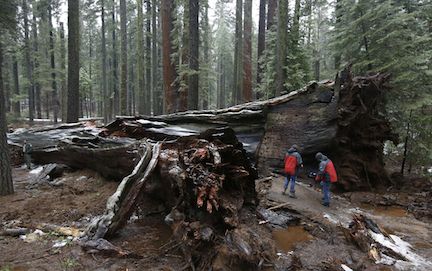Bringing Down the Mighty Sequoia
If there was ever a David and Goliath battle, this is it. A pinhead-sized beetle, no more than a couple of millimetres long, versus a giant sequoia tree, taller than a football field and older than the Bible. And the tiny beetle, well, swarming armies of beetles, are winning. — Mark Saunokonoko, Senior Journalist, reporting for 9News.
And now, on the Western slopes of the Rocky Mountains, a giant Sequoia — one of many — lies rotting.
It was a growing sapling when Christ walked the shores of Galilee. When Columbus discovered America, it was reaching maturity, and it looked down from lofty heights during the American Civil War. It seemed destined to live many centuries more.
Then, a few years ago, a tiny beetle started to burrow into its bark and lay eggs that would produce other beetles. It seemed like an unequal battle at first, but the few beetles multiplied into hundreds, then into thousands, and finally into millions. First they attacked the bark, then they worked deeper into the trunk, and finally, they were eating the very heart and strength of that magnificent forest giant.
Then one day, after withstanding the elements for centuries, the rain came, the winds blew, the lightning flashed, and the giant tree fell. Not because of the elements, but because of the weakening effects of those tiny beetles. — Author Unknown

"The beetles," Saunokonoko continues, "Phloeosinus punctatus, bury inside the bark of the sequoias, eating the giants from the inside out, until they topple over and fall to the forest floor."
Click into the article here to watch a video about the plight of the mighty Sequoias.
Bad habits do the same thing to people. They slowly take a toll, eating away at our hearts, our souls, our integrity, from the inside out, until the day comes when a person's life comes crashing down, just like those majestic Sequoia trees.
"But each person is tempted when he is lured and enticed by his own desire. Then desire when it has conceived gives birth to sin, and sin when it is fully grown brings forth death" (James 1:14-15, ESV).
"You say, 'I am allowed to do anything'—but not everything is good for you. You say, 'I am allowed to do anything'—but not everything is beneficial" (1 Corinthians 10:23, NLT).
What's In A Kiss
Sharing affection can be a germy, dangerous thing. So says the results of a recent Dutch study published in the journal Microbiome. The more intimate the affectionate display, the germier the exchange.
A similar study out of the University of West Virginia says that a simple fist bump is the least hazardous of contact displays of affections. "Knocking knuckles measured 20 times less germy than a handshake."
A quick high five will trim 75% of the germs off those exchanged in a shake, while an actual handshake can "transport up to 124 million colony-forming units of E. coli bacteria -- and that's assuming clean hands. More bacteria changed hands with a firmer grip and longer squeeze."
The Dutch study concluded that a simple peck on the lips will result in the exchange of over 1000 different kinds of germs.
But it's the full-on French kiss that's the killer. "Swapping spit for about 10-seconds transfers up to 80 million bacteria between lovers. The shorter partner in the smooch may take on even more germs because, as the researchers helpfully noted, saliva travels downward."
This was, perhaps, more information than you cared to know. It just goes to show that even the most wonderful things we share among ourselves are flawed. But there was one kiss that was absolutely perfect. It's described in Psalm 85:10 where we read, "Mercy and truth are met together; righteousness and peace have kissed" (KJV).
In the sacrificial life and death of Jesus, in that great show of ultimate love and affection, God came near to us, and exposed Himself intimately to our germiness. In that exchange, we infected Him with our sin, while He infected us with His righteousness.
So what's in a kiss? Salvation!
Cockroach Theology
Cockroaches are the scourge of domestic civilization. The sight of one can bring maddening screams of fright or disgust. Germy, pesky creatures—they invade our lives and our nightmares. Americans spend billions of dollars a year on pesticides and extermination services to rid themselves of these and similarly dirty, defiling creatures. But beyond their threat to the sanitation of your kitchen and bath they pose a less well-known danger—to our libraries!
You know that sticky, brown goo you sometimes see on the bindings and pages of old books. Well, guess what? It’s not glue! It’s a sexual attractant emitted by the American cockroach as it seeks to build a home for itself among our literary holdings.
“There are four types associated with damage to library materials: the American cockroach, the Australian cockroach, the Oriental cockroach, and the German cockroach. All four species have . . . a fondness for starch, thus book cloth and paper are especially vulnerable.”
We tend to be more sensitive to those things which defile or threaten where we spend the balk of our lives, in the kitchens and the baths of life's everyday experiences. More subtle is the threat to our literary holdings, to our doctrine. Compromise and equivocation are the defiling scourge, eating away at the pulp of our doctrinal soundness. These threats must be exterminated to protect the health and vitality of our doctrinal integrity.